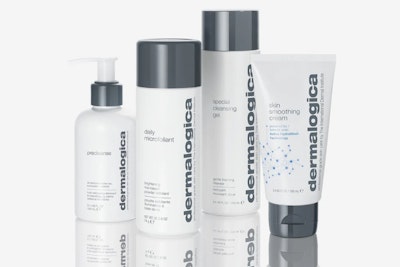Dermalogica
Professional-grade skin care for all skin types and concerns

Dermalogica's Sustainability Rating
Acceptable
Ingredients
Dermalogica has made ingredient commitments to lower its environmental impact, including by avoiding parabens, other petrochemical-based ingredients, uncertified palm oil or palm oil-derived ingredients, and microplastics. While it has made commitments, it still use some ingredients that pose a significant threat to the climate, including other petrochemical-based ingredients, uncertified palm oil or palm oil-derived ingredients, and harmful suncare ingredients. Its products incorporate biodegradable ingredients. It carries products that have certifications from PETA Animal Test-free and Leaping Bunny.
Containers & Packaging
Dermalogica and its parent company, Unilever, have made efforts to minimize the amount of material used in some of its product containers, including by specific efforts to avoid excessive materials. It uses eco-friendly materials in its product containers, including ones that are FSC-certified and recyclable, and its shipping packaging includes materials that are SFI certified.
Energy & Water Use
Dermalogica's parent company, Unilever, shares information on its energy strategy. It uses some renewable energy to power its production sites and corporate offices. Dermalogica has targets for expanding its use of renewable energy. It implements energy efficiency measures in its production sites and corporate offices. It implements water conservation measures. Dermalogica has a global production span, which is standard for the industry.
Refill & Reuse
Dermalogica utilizes alternative models for some products to avert waste, including offering a takeback program with TerraCycle that allows customers to send in used containers to be recycled. It offers bulk sizes for some products, which may help reduce packaging waste.
Slow Cleaning
Dermalogica offers frequent releases, which can encourage overconsumption and production of excess inventory.
Marketing
Commons is still evaluating this brand's marketing emails.
Transparency & Reporting
Dermalogica has a prominent sustainability page with high-level details on its climate strategy. It's parent company, Unilever, publishes a detailed annual report with a clear, impact-driven strategy and progress reporting. Its last annual report was published in 2023. Dermalogica shares a complete list of ingredients used in its products on a per product basis. It provides an ingredient glossary that does not include all the ingredients used in products which can be misleading to consumers.
Emissions Tracking
Dermalogica's parent company, Unilever, internally measures and publicly reports its company-level emissions in partnership with, or with auditing from, a third party. It includes a breakdown by scope. The last reporting period was 2023. In its most recent update, its estimated emissions footprint was 110,153,969 tons CO2e.
Targets & Offsets
Dermalogica's parent company, Unilever, has SBTi-approved emissions reduction targets for the medium-term (5-10 years) and long-term (10+ years). It has reported on its progress within the past year, and is on track for some of its targets. Its overall net-zero commitment was removed by SBTi due to failure to meet deadlines. Commons couldn't find evidence that this brand offsets any emissions.
Supply Chain & Labor
Dermalogica's parent company, publishes limited information about its supply chain partners, disclosing their geographic locations. It publicly shares a supplier code of conduct, which prohibits forced labor, establishes grievance mechanisms, prohibits child labor, and includes environmental clauses. Its code of conduct doesn't disallow unauthorized subcontracting or ensures a living wage. Unilever doesn't have a stated policy of regularly auditing its supply chain partners. This may increase human and environmental risks.
Advocacy
Dermalogica's parent comapny, Unilever, discloses all of its trade association memberships, including those that are climate-obstructive. It's a member of 1 large climate-obstructive trade associations: Personal Care Products Council. It isn't a member of advocacy organizations advancing climate policy. It doesn't employ any state lobbyists. Unilever didn't donate more than $100k to climate-obstructive candidates or PACs from 2018-2024.
Dermalogica is rated Acceptable because it has started to improve its products and packaging, but still has room to grow.
Dermalogica has committed to avoiding select ingredients that pose a threat to the climate, including parabens, other petrochemical-based ingredients, uncertified palm oil or palm oil-derived ingredients, and microplastics. It offers a takeback program through TerraCycle to recycle used containers to help reduce its waste and emissions footprint. Its parent company reports on its renewable energy strategy, and emissions measurement and reduction efforts.
However, Dermalogica uses primarily plastic packaging of a virgin or PCR source, which contributes greatly to waste production and excess energy use. While it avoids select ingredients, it still uses some that pose a significant threat to the climate, including other petrochemical-based ingredients and harmful suncare ingredients. Its parent company has SBTi approved emissions reduction targets, though its net zero commitment was removed for failing to meet deadlines.
Dermalogica is owned by Unilever.
Our ratings are based on a scale from 1 (bad) to 5 (best). How we rate →
https://www.dermalogica.com/pages/sustainability
https://dermalogicame.com/pages/company-faqs
https://www.unilever.com/files/66bc4aea-608f-46ee-8da3-cde0ec8ebe90/unilever-annual-report-and-accounts-2023.pdf https://www.dermalogica.com/pages/sustainability
https://www.unilever.com/files/66bc4aea-608f-46ee-8da3-cde0ec8ebe90/unilever-annual-report-and-accounts-2023.pdf
https://dermalogicame.com/pages/company-faqs https://www.unilever.com/files/66bc4aea-608f-46ee-8da3-cde0ec8ebe90/unilever-annual-report-and-accounts-2023.pdf
https://www.unilever.com/files/unilever-annual-report-and-accounts-2024.pdf
https://www.unilever.com/sustainability/nature/#improving-water-security
https://www.dermalogica.com/collections/refill/products/daily-microfoliant-refill?variant=36267585765528&selling_plan=2411856024 https://www.dermalogica.com/pages/terracycle
https://www.dermalogica.com/collections/jumbos
https://www.dermalogica.com/collections/new-arrivals
https://www.unilever.com/sustainability/responsible-business/sustainability-performance-data/
https://www.dermalogica.ca/pages/ingredients?srsltid=AfmBOorf6hKtefDtDrowuViJStvQ6CaHTcH31mJ5Wx7skDAsfx2xzVfv https://www.dermalogica.com/collections/toners/products/multi-active-toner?variant=36070252740760&selling_plan=2405433496
https://sciencebasedtargets.org/target-dashboard
https://trellis.net/article/microsoft-pg-unilever-and-walmart-among-239-companies-miss-net-zero-deadline/
https://dermalogicame.com/pages/sustainability-1
https://www.unilever.com/files/d3f86865-f6e2-4ab3-872c-bf395d1ef781/Unilever-Supply-Chain-Overview-Spend%20Analysis-May-2022.pdf
https://www.unilever.com/files/unilever-annual-report-and-accounts-2024.pdf https://www.unilever.com/files/e6e301e3-7e20-4363-b6aa-ef0f4a4e3322/responsible-sourcing-policy-interactive-final.pdf
https://www.hul.co.in/files/hul-business-responsibility-sustainability-report-fy-2023-24.pdf
https://transparency-register.europa.eu/searchregister-or-update/organisation-detail_en?id=6200524920-25
https://www.personalcarecouncil.org/about-us/member-companies/
https://fminus.org/lobbyists/
https://www.fec.gov/data/browse-data/
Get Rewards
Earn for sustainable purchases
Commons rewards you for sustainable purchases from all our Top Rated brands, plus thousands of everyday purchases — from thrift stores to public transit.
Learn more about rewards ->







